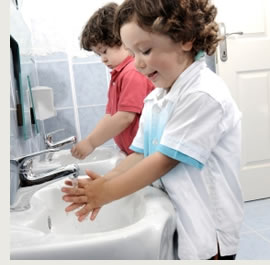|
|
|||||
|
|||||
| Enterovirus 71 (EV71) | |||||
| What child care providers need to know about EV71 | |||||
|
The spike in recorded cases prompted NSW Health to write to early childhood education and care providers about the best ways to prevent and respond to an outbreak of EV71. EV71 is fairly rare in NSW and there is currently no vaccine available in Australia. General enteroviruses are relatively common in the community, particularly in the warmer months, and can cause a range of illnesses, including fevers, rashes, and the common childhood infection hand, foot and mouth disease, and may sometimes lead to neurological complications, including inflammation of brain or spinal cord, leading to irritability, jerky movements, unsteadiness and weakness. These symptoms can also be caused by other types of serious infections, including meningococcal bacterial, so any child or adult with these symptoms should see a doctor immediately so the cause can be investigated and managed quickly. The best way to reduce the chances of infection in your service is to practice good hand hygiene, especially washing hands with soap and water after going to the toilet, before eating, after wiping noses, and after changing nappies or soiled clothing. Children should also be taught to cover their coughs and sneezes with a tissue. If no tissues are available then coughing or sneezing into your elbow is better than into your hands. Other practices which will protect against an EV71 outbreak include:
NSW Health says no deaths have been reported through its surveillance systems, however, the NSW Coroner's Office is investigating the death of three young children between late December 2012 and late March 2013 to determine whether they are linked to EV71 infections. Further reading NSW Health urges parents to be aware but not alarmed about enterovirus. |
|
|||||||||

 Child care providers are advised to be aware but not alarmed about an outbreak of enterovirus 71 (EV71) in south eastern Australia.
Child care providers are advised to be aware but not alarmed about an outbreak of enterovirus 71 (EV71) in south eastern Australia.